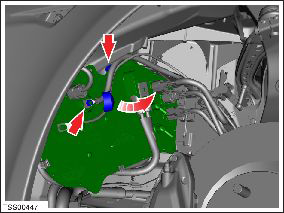Tesla Model S: DCDC Converter - 1st Generation (Remove and Replace)
Warning: Only technicians who have been trained in High Voltage Awareness are permitted to perform this procedure. Proper personal protective equipment (PPE) and insulating HV gloves with a minimum rating of class 00 (500V) must be worn any time a high voltage cable is handled. Refer to Tech Note TN-15-92-003, "High Voltage Awareness Care Points" for additional safety information.
Warning: To avoid personal injury or equipment damage from electrostatic discharge, an ESD wrist strap must be worn while carrying out this procedure.
Removal
- Perform the vehicle electrical isolation procedure (refer to procedure).
- Remove the front RH upper wheel arch liner (refer to procedure).
- Clamp the DCDC converter feed and return coolant hoses.
- Position a container to collect the coolant.
- Release the clips (x2) that secure the feed and return coolant
hoses to the DCDC converter. Release the hoses from the converter.
Caution: Plug pipe connections to prevent ingress of moisture or dirt.
Note: Note installed position of components before removal.

- Remove the nut and washers that secure the 12V ground terminal
to the DCDC converter (torque 16 Nm). Release the harness and move
it aside.

- Release the DCDC converter 12V positive terminal insulation cover.
- Remove the nut and washers securing the 12V positive terminal to the DCDC converter (torque 9 Nm). Release the harness and move it aside.
- Release the clip that secures the harness to the DCDC converter.

Warning: Ensure that the multimeter and leads are capable of handling at least 500V.
- Remove the bolt that secures the HV connector cover (torque 18 Nm).
- Use a multimeter to check voltages across the HV cables and to
ground:
- B+ to ground
- B- to ground
- B+ to B- Warning: If any voltage reading is more than 10V, the high voltage contactors are not fully opened. Due to the risk of electrocution, contact Service Engineering before performing any further work.
- Disconnect the HV harness from the DCDC converter (torque 5 Nm).
- Disconnect the HV harness connectors (x3) that secure the battery coolant, electric heater, cabin heater and compressor to the DCDC converter. Note: Note installed position of components before removal.
- Disconnect the signal harness connector from the DCDC converter.
- Release the clips (x3) that secure the harness to the DCDC
converter.

- Remove the bolt and nuts (x2) that secure the DCDC converter to
the body (torque 9 Nm).

- Remove the DCDC converter from the vehicle.

Installation procedure is the reverse of removal, except for the following:
Warning: Only use cleaning agents and solvents in a well-ventilated area.
Note: Clean the affected areas before installation.
- Refill and bleed the cooling system (refer to procedure).
- If necessary, perform a full firmware update.

